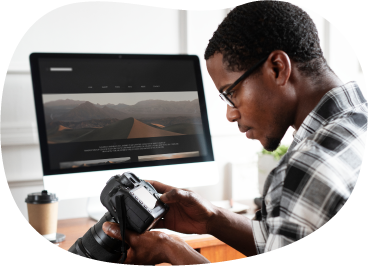Photography and Videography Business Insurance in Texas


Photographer and videographer insurance in Texas
Insurance helps pay for costly lawsuits and accidents, and sometimes it's required by law. Learn about business insurance requirements and the most common policies for Texas photographers and videographers.

Get the right insurance, fast
With Insureon, photographers and videographers can get insured quickly.
Fill out our easy online application to get quotes from top-rated carriers. A licensed agent will help you find the best insurance coverage for your risks.
What are the most common policies for TX photographers and videographers?
These insurance policies provide the best coverage for the risks faced by photographers and videographers in Texas. You may need different types of insurance for contracts, loans, or leases.
General liability insurance
This policy covers third-party accidents, such as a customer who trips over a tripod and suffers an injury in your studio. Bundle it with commercial property insurance for savings in a BOP.
- Slip-and-fall accidents
- Damaged customer property
- Libel and slander lawsuits
Business owner’s policy
Small photo and video studios are often eligible for a business owner's policy, or BOP. This policy bundles general liability coverage and commercial property insurance at a discount.
- Customer injuries
- Customer property damage
- Camera equipment coverage
Professional liability insurance
This policy covers legal fees if a client sues a photographer or videographer for negligence. It's sometimes referred to as errors and omissions insurance (E&O).
- Lost or damaged memory cards
- Missed photo shoots
- Accusations of substandard quality
Workers’ compensation insurance
Workers' comp covers medical costs and disability benefits for workplace injuries. It's recommended for small businesses and sole proprietors, as health insurance can deny work-related injury claims.
- Employee medical expenses
- Disability benefits
- Workplace injury lawsuits
Commercial auto insurance
This policy covers the cost of accidents involving a vehicle owned by a photography or videography business. Texas requires this coverage for business-owned vehicles.
- Property damage caused by your vehicle
- Bodily injuries from an auto accident
- Vehicle theft and vandalism
Inland marine insurance
This type of camera equipment insurance protects items that travel outside of your office. It covers property losses due to theft, fires, storms, and vandalism.
- Cameras and backdrops used off-site
- Photography equipment in transit
- Video equipment at a filming location
Which policies are required for photographers and videographers in TX?
Photographers and videographers in Texas may need to carry the following types of insurance to comply with state laws and the terms of contracts:
General liability insurance
General liability insurance protects your business from expenses associated with common mishaps, such as customer bodily injuries and accidental property damage.
Photographers and videographers might need this coverage to sign a commercial lease or qualify for a business loan. Clients and venues might also ask for proof of insurance. Adding commercial umbrella insurance can boost your limits on general liability insurance and other kinds of photographer liability insurance.
A general liability policy also helps protect against advertising injuries, such as libel, slander, and copyright infringement. So, if an employee at your photography studio defames a competitor on social media, this policy would cover your legal costs if the other business sues.
A business owner’s policy bundles general liability insurance with commercial property insurance at a discount, and protects against common lawsuits and damaged business equipment.
Workers' compensation insurance
Unlike other states, Texas law does not require photographers and videographers to carry workers’ compensation insurance, even when they have employees.
Business owners depend on workers' comp to cover medical costs and lost wages resulting from workplace injuries, as personal health insurance can deny claims for injuries that are related to work. Because medical bills are so expensive, even independent contractors and sole proprietors should considering buying this coverage.
Policies typically include employer's liability insurance, which shields employers from legal costs if an employee blames them for their injury.
Commercial auto insurance
Commercial auto insurance protects vehicles owned by your photo or video company, such as a van used to transport cameras or film equipment. It covers legal bills and other costs resulting from an accident, along with vehicle theft, weather damage, and vandalism.
Texas requires auto liability insurance in the following amounts:
- Bodily injury liability per person: $30,000
- Bodily injury liability per accident: $60,000
- Property damage liability per accident: $25,000
All insurance companies in Texas include personal injury protection (PIP) in their policies.
For vehicles that are used for business but are leased, rented, or otherwise not owned by the company, you'll need hired and non-owned auto insurance (HNOA). This can be bought as standalone coverage or an add-on to your general liability insurance or commercial auto insurance.
Personal auto insurance will not cover accidents that occur during work-related activities, which is why you likely need additional coverage.

How much is photography insurance in Texas?

Photographers and videographers in Texas who buy policies from Insureon pay an average of:
General liability: $29 per month
Business owner's policy: $50 per month
Professional liability: $33 per month
Factors that affect videographer and photographer insurance costs include:
- Services you offer, such as portraits or wedding photos
- Value of your cameras, lighting equipment, and other business property
- Location, such as Austin, Houston, or Dallas
- Business income and size
- Policy limits and deductibles
- Coverage options, such as an additional insured
Top photo and video businesses
Don't see your profession? Don't worry.
We insure most businesses.
Verified business insurance reviews
Hear from customers like you who purchased small business insurance.
Do photographers need a business license in Texas?
Texas doesn't have a general, state-wide business license. However, photographers and videographers must typically get a license from their county or city, and comply with additional regulations.
Here's a quick summary of what you might need:
- You likely need a business license issued by your city, county, or other local municipality.
- You need to register your business with the Texas Secretary of State or your county clerk’s office.
- You must have a sales tax permit from the Comptroller of Public Accounts in order to sell taxable goods and services.
- You may need a permit to take photographs or conduct a film shoot on public property, such as a state park or a museum, or if using drones. Again, you'll need to check the regulations for your area.
The Texas Business Permit Office provides detailed information about licenses and permits, with videos and guides on the topic. The Secretary of State's office has additional resources as well.
How do I become a certified professional photographer (CPP) in Texas?
The Certified Professional Photographer designation is earned through the Professional Photographers of America (PPA), a nonprofit trade association. It can help elevate you above the competition, and members gain access to online classes and workshops, photography insurance policies, and copyright and licensing resources.
The certification process is the same in every state, including Texas:
- Fill out the CPP Candidacy form and pay a $200 application fee
- Take an online exam
- Submit your images for evaluation
Photographers who earn the designation must recertify every three years. This requires participating in continuing education such as workshops, conventions, or the Imaging USA photography expo.
How do I get Texas videography and photography business insurance?
Insureon helps Texas photographers and videographers save time and money shopping for insurance by comparing quotes from top-rated U.S. insurance companies.
Our insurance agents are licensed in Texas and can answer your questions as you consider coverage.
To make the application go quicker, have this information ready:
- Workforce details, such as payroll and number of employees
- Current and projected revenue
- Business partnerships
- Desired coverage limits
- Commercial lease insurance requirements
Apply for free insurance quotes for your photo or video business today. We can work with you to identify and purchase the best types of coverage for your business. Most small business owners receive a certificate of insurance the same day.




